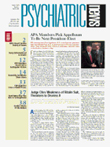A lawsuit charging that APA and Novartis Pharmaceuticals conspired to create the attention deficit/hyperactivity order diagnosis as a way to build a market for Ritalin may be coming to a quick end, in California at least. Similar suits have been filed in Texas, New Jersey, Florida, and Puerto Rico.
On March 13 Judge Rudi M. Brewster of U.S. District Court in San Diego said he will dismiss the California suit unless the plaintiffs who filed it correct serious defects in it. He gave them until April 16.
Among the flaws he cited, for example, are those that derive from a California statute that prohibits lawsuits in which the claims against defendants are based on actions that are clearly covered by the First Amendment’s guarantee of the right of free speech, as appears to be the case in the Ritalin/ADHD suit.
APA Medical Director Steven Mirin, M.D., applauded Brewster’s ruling, saying that it “confirms that this lawsuit, and others like it, have no basis in law or fact. ADHD is a real disease that requires professional diagnosis and treatment.”
He called the judge’s dismissal threat “a victory for parents seeking to act in the best interest of their children.”
The lawsuit, which was filed last September, a few months after a very similar one in Texas and during the same week as a nearly identical one in New Jersey, charged that APA and Novartis conspired to define attention deficit disorder (ADD) and later ADHD in APA’s Diagnostic and Statistical Manual in an unnecessarily broad manner as part of a campaign to hype the efficacy of Ritalin (methylphenidate) as a treatment for the disorder and thus boost sales of the drug (Psychiatric News, August 4 and October 6, 2000).
Ritalin was introduced in 1955 and was manufactured by Ciba-Geigy, which in 1997 merged with Sandoz to form Novartis.
The three suits also name the nonprofit advocacy organization Children and Adults With Attention Deficit/Hyperactivity Disorder (CHADD) as a defendant, charging it with being part of the conspiracy to increase Ritalin sales as a direct result of receiving substantial financial support from Novartis.
The class-action lawsuits in California and New Jersey were filed by the same attorneys who successfully took on the tobacco industry in the 1990s. They seek damages on behalf of all children who have been diagnosed with ADHD and taken Ritalin for the disorder, claiming that they were harmed by having to take the medication and suffered financial damage as a result of their purchase of unneeded medication.
The California case was brought by Deborah Vess on behalf of her minor son and all other children in the state who were prescribed Ritalin.
In threatening to dismiss the California suit, Brewster pointed out that the plaintiffs have failed to allege any link between APA’s development of the ADHD diagnosis for the DSM and the injuries the plaintiff class alleges to have suffered. He also noted that the plaintiffs have not provided any evidence to indicate that APA or Novartis made any false representations regarding the diagnosis or the potential efficacy of Ritalin in treating ADHD.
The bottom line of the criticisms the judge made about the grounds on which the suit was filed is that in his view the plaintiffs failed to allege that they have been victimized by any actionable conduct or damage.
The California law that formed the basis of Brewster’s dismissal threat is, he noted in his decision, “intended to deter lawsuits brought primarily to chill the valid exercise of the constitutional rights of freedom of speech and petition for the redress of grievances.”
To avoid dismissal of such a suit, plaintiffs are obligated to provide the court with evidence that the statements that caused them to suffer damages or harm are false. The plaintiffs in this case have so far failed to meet that requirement, he noted, for their charges against APA, Novartis, or CHADD.
APA and the other defendants cannot yet claim a complete victory, however, since the judge allowed the plaintiffs several weeks to amend their suit to correct the major defects he identified. If they do file an amended complaint by the April 16 deadline, then it is likely that more hearings will follow before there is any further resolution.
The good news for APA that came out of the San Diego court is tempered, however, by the fact that the Texas and New Jersey suits are still pending and will not be evaluated in conjunction with the same free-speech statute. They will instead be weighed according to the common law and formal statutes in those states regarding, for example, fraud, conspiracy, and negligence, noted APA counsel JoAnn Macbeth, J.D., of the Washington, D.C., law firm Crowell and Moring.
Macbeth also pointed out that similar Ritalin-based class-action suits have been filed in Florida and Puerto Rico.
She said that it is likely that the decision in the California case will “be very useful as a precedent” when APA and Novartis argue for dismissal of the other cases. ▪
